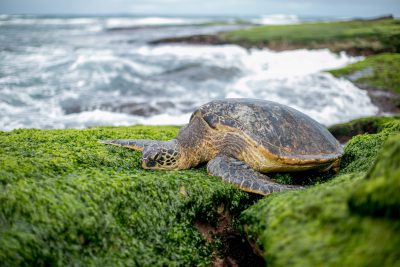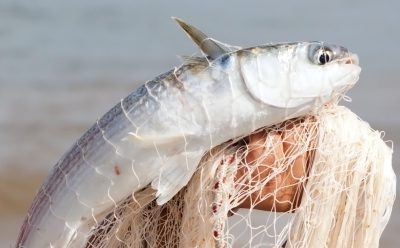Oceans cover 70 percent of the Earth. They produce more oxygen than the Amazon, regulate the Earth’s climate, and are home to an extraordinary wealth of life. But due to human activity, the oceans are under threat like never before.
What can we do?
1. Stop Eating Fish
Fishing in all forms, be it via pole and line or trawler vessels, damages the intricately balanced predator-prey ecosystem under the sea. Fishing is wiping out entire populations, and destroying the landscape beneath the waves. Plus, most of the plastic which is polluting our oceans comes from the fishing industry. We can prevent all this damage when we stop eating fish.
2. Refuse To Use Single-Use Plastics
Plastic is suffocating the ocean, polluting the seas, and killing aquatic life. We are dumping 12.7 million tonnes of the stuff into our oceans every year. A scary thought. But we can all break our toxic relationship with plastic. Simply buy reusable coffee cups and water bottles, use metal straws, and refuse single-use plastic food packaging wherever you can.
3. Ask Yourself: Do I Need This?
Before you reach for another pair of plastic earrings, or buy another pair of dyed jeans, think to yourself how much will I really use this? Does this item have longevity? If you can’t guarantee that the answer is Yes, you might want to consider a more sustainable alternative.
4. Use Biodegradable Detergents and Cleaning Products
Biodegradable cleaning products help to keep our waterways clean and free from toxic pollution. Some great brands to look out for are Ecover, Ecozone and Bio D. It’s a simple switch that can make a big difference.
5. Refuse to Use Micro-Plastics
Micro-plastics are small pieces of polyethylene that are sometimes added to beauty and cosmetic products such as cleansers and toothpastes. These harmful plastics are difficult to process out of our water and can end up choking microorganisms in the ocean.
6. Use Beaches Responsibly
When visiting the coast, make a concerted effort to leave the environment in the same state as when you arrived. Take home your waste and ensure your skincare products don’t spray onto the sand.
7. Don’t Buy Items Which Exploit Marine Life
Shell and coral accessories might look appealing, but if you saw the devastation behind the pretty exterior, you might think twice about making that purchase. Always ensure your shell is faux.
8. Support Conservation Projects
Surfers Against Sewage, Greenpeace, and Sea Shepherd run ocean conservation programmes which are in need of your help. Take a look at their sites and support them if you can.
9. Travel Smart Through Our Oceans
Eco-friendly marine tourism is possible and can be achieved when you travel through a certified body. This will ensure you have minimal impact on the local ocean ecosystem.
10. Ditch Meat, Eggs, and Dairy
There are so many ways eating meat, eggs, and dairy harms the oceans
First, toxins from animal farming—mostly manure and fertilizer—pour into waterways. These dangerous pollutants stimulate algal growth, which sucks the oxygen from the water, creating ocean dead zones where no life can survive.
Then, global warming, which is driven by the farming of animals, has a devastating impact on the oceans. but when we protect the oceans, we can slow climate change.
A third way is that vast numbers of fish are taken from the ocean and fed to farmed animals, including farmed fish.
For all these reasons and more, eating plant-based is the best thing we can do to help our oceans.



